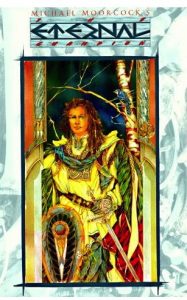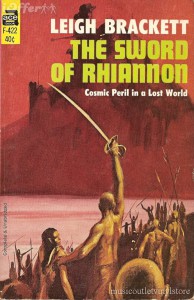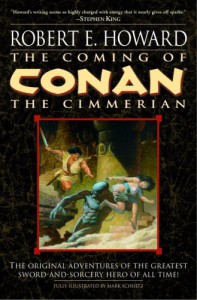Appendix N and Fantasy Exploration
 While I’d been introduced to fantasy fiction when my mom read me The Hobbit, it was Dungeons & Dragons that sent me exploring for more of it. Appendix N lay at the very back of The Dungeon Master’s Guide, and there were treasures within. The problem was that the library didn’t HAVE most of those treasures. I’ve sometimes wondered how my writing and reading life would have differed if the library had actually held any Robert E. Howard books, not to mention a whole bunch of other things Appendix N said were must reads. The library DID have the Amber series, but the first few books were checked out for months.
While I’d been introduced to fantasy fiction when my mom read me The Hobbit, it was Dungeons & Dragons that sent me exploring for more of it. Appendix N lay at the very back of The Dungeon Master’s Guide, and there were treasures within. The problem was that the library didn’t HAVE most of those treasures. I’ve sometimes wondered how my writing and reading life would have differed if the library had actually held any Robert E. Howard books, not to mention a whole bunch of other things Appendix N said were must reads. The library DID have the Amber series, but the first few books were checked out for months.
Fortunately there were used bookstores in town. And even more fortunately I found a great copy of Swords Against Death by some guy that Appendix N recommended highly, Fritz Leiber. The first story wasn’t much of a thing, kind of an intro. But from there… wow. I knew I’d found something really good. It remains one of the finest sword-and-sorcery collections I’ve ever read, and my favorite of all the Lankhmar books. Sure, there are other great Lankhmar stories, but I don’t think any other Lankhmar book is as consistently excellent.
 The same bookstore had the Corum books by Michael Moorcock – both trilogies – and some more Lankhmar, and friends had the Elric novels and, thankfully, the Amber books. After devouring those I knew that I was a fantasy fan, but I didn’t realize it was sword-and-sorcery that particularly ticked my clock until years later.
The same bookstore had the Corum books by Michael Moorcock – both trilogies – and some more Lankhmar, and friends had the Elric novels and, thankfully, the Amber books. After devouring those I knew that I was a fantasy fan, but I didn’t realize it was sword-and-sorcery that particularly ticked my clock until years later.
In my late twenties I decided that if I was really serious about writing fantasy it would be wise to understand the roots of the genre. At that point in time I was living in Topeka Kansas, which had three excellent used book stores, and was only twenty minutes from a very fine used book store in Lawrence Kansas. Between those four stores and some internet searches I was able to track down a whole slew of older, out of print books and explore the grandfathers and grandmothers of fantasy. The famed Ballantine Adult Fantasy series was a huge help. Helmed by Lin Carter and Betty Ballantine in the late ‘60s and early ‘70s, the Ballantine Adult Fantasy series showcased a whole bunch of lost classics and influential fantasy writers.
It was interesting reading, even when I discovered I wasn’t that fond of the writer. For instance, William Morris was really important… but his characters were pretty wooden. Lord Dunsany, though, was a revelation, and E.R. Eddison was a marvel. I enjoyed various other greats and near greats, but none of them thrilled me nearly as much as Robert E. Howard and Leigh Brackett.
 After two or three years of exploration I’d discovered that while I liked fantasy in general, it was sword-and-sorcery (and sword-and-planet, particularly Leigh Bracket!) that I liked the most. And so I’ve been a proponent of the sub-genre ever since. Surely, there is bad s and s, but there is also good, and in recent years there has been a steadily rising supply of it after a dearth of many years. Some of the best fiction has been from Warhammer authors like Nathan Long, Clint Werner, and some guy named William King, and I’m always puzzled that sword-and-sorcery fans in the wider world haven’t heard of Gotrek and Felix, Brunner, or Ulrika and the Blackhearts (sounds like a line-up of hard rock bands, doesn’t it?)
After two or three years of exploration I’d discovered that while I liked fantasy in general, it was sword-and-sorcery (and sword-and-planet, particularly Leigh Bracket!) that I liked the most. And so I’ve been a proponent of the sub-genre ever since. Surely, there is bad s and s, but there is also good, and in recent years there has been a steadily rising supply of it after a dearth of many years. Some of the best fiction has been from Warhammer authors like Nathan Long, Clint Werner, and some guy named William King, and I’m always puzzled that sword-and-sorcery fans in the wider world haven’t heard of Gotrek and Felix, Brunner, or Ulrika and the Blackhearts (sounds like a line-up of hard rock bands, doesn’t it?)
Back in the early ‘90s the lone sword-and-sorcery author seemed to be the late, great, David Gemmell, but the door has widened. Writers like Joe Abercrombie, Matthew Stover, and Scott Lynch pushed it open and more and more sword-and-sorcery writers have come through after them, me along with them.
 What do I like about sword-and-sorcery? There are protagonists who must live by their wit and weapons skills in deadly lands, beset by schemers and intriguers. There is treasure to be found, and ancient secrets. There are loyal comrades, implacable foes, powerful but foolish kings, secret societies, fabulous kingdoms, and dark wizards and forbidden secrets. There is world building, surely, but there is forward momentum and a distinct lack of navel gazing. In the hands of the best sword-and-sorcery practitioners, story comes first – and it may be that it’s this craftsmanship that appeals to me most strongly. I like a good slice-of-life tale or literary experiment sometimes, but what I prefer is a tale where interesting people go off to interesting places and do interesting things.
What do I like about sword-and-sorcery? There are protagonists who must live by their wit and weapons skills in deadly lands, beset by schemers and intriguers. There is treasure to be found, and ancient secrets. There are loyal comrades, implacable foes, powerful but foolish kings, secret societies, fabulous kingdoms, and dark wizards and forbidden secrets. There is world building, surely, but there is forward momentum and a distinct lack of navel gazing. In the hands of the best sword-and-sorcery practitioners, story comes first – and it may be that it’s this craftsmanship that appeals to me most strongly. I like a good slice-of-life tale or literary experiment sometimes, but what I prefer is a tale where interesting people go off to interesting places and do interesting things.
Thanks to Robert E. Howard and Harold Lamb I was exposed to masterful historical adventure fiction, and because of a whole bunch of additional influences I fell in love with 8th century Arabia and the 1001 Nights. My own Dabir and Asim work is a marriage of that love for Arabian fantasy tales and all the things I like in sword-and-sorcery. I wouldn’t have written that kind of stuff if I wasn’t a fan, and it’s my sincerest wish that readers will find the same kind of thrill in my work that I’ve found in my own favorite writers.
This essay originally appeared in 2012 on Bill King’s web site.
15 Comments